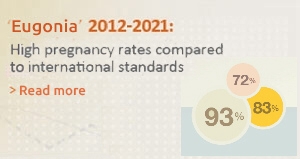This is about counting the number of follicles with an antrum (antral follicles) during the basic ultrasound. These follicles, also known as small antral follicles, are of small size (2-8mm) and can be counted in the basic ultrasound on the 2nd or 3rd day of the menstrual cycle.
Recent studies and long clinical experience have shown that the counting of the antral follicles is a strong prognostic factor of estimating ovarian reserves, since it greatly reflects the reserves of the primordial follicles (i.e. the total of the very small follicles, not visible during the ultrasound) of the ovaries. With the application of a complicated statistical analysis (multivariate logistic regression analysis) researchers have shown that the number of small antral follicles in the basic ultrasound, in combination with the age of a woman, is the best predictive factor for the follicles that are going to develop after pharmaceutical stimulation of the ovaries.
Every primordial follicle contains an immature oocyte, which has the potential to develop and mature at some point in the future, during the reproductive life of a woman. Therefore, when there is a small number antral follicles in the basic ultrasound, this means that there is an equally low number of primordial follicles (i.e. low ovarian reserve). On the contrary, an excessive number of antral follicles is an indication for polycystic ovaries.
The assessment of the ovarian reserve with a transvaginal ultrasound counting of the small antral follicles in combination with the measuring of the FSH, E2 and AMH offers important information for a future assisted reproduction treatment cycle, such as:
- The ovarian response to the pharmaceutical stimulation, i.e. the number of follicles that are going to develop. The prediction of the ovarian response is more precise when there are very low or very high numbers of small antral follicles. On the contrary, an average number of small antral follicles is a less powerful prediction factor.
- The number of oocytes that are going to be retrieved.
- The chances of cycle cancellation.
- The optimal stimulation protocol.
- The quality of the oocytes and the embryos.
- The chances of achieving a pregnancy.






























